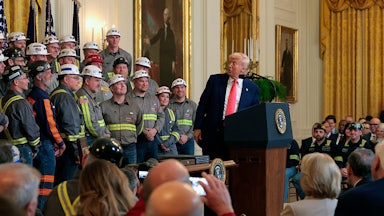According to a popular Obama-era joke, Toyota issued a recall notice after it came to the company’s attention that several Priuses had left the factory without their Obama bumper sticker. People found the fiction funny because it reflected what everyone knew at the time: Driving a hybrid car was a political statement. Just like a Blue Lives Matter flag, an N95 mask, or an “In This House We Believe” sign, the Prius was an accessory reflecting a person’s political views—in its case, concern about climate change.
The less amusing reality behind the recall joke was that the liberal emphasis on taking personal responsibility for climate change through more thoughtful consumer habits backfired badly; it helped fuel a polarizing culture war, in which Americans with conservative views came to see driving a gas-guzzler, eating meat, and other climate-unfriendly practices as salient to their political and cultural identities, while recycling, eating vegan, and other environmental habits became coded as coastal leftist habits. The environmental movement to some extent enabled this cultural divide in prior decades with its emphasis on personal consumption, which lends itself to a view of environmentalism as a matter of identity politics. (Tragically, this also played into the hands of the fossil fuel industry’s own efforts to shift blame onto consumers.)
All this may be changing. Good policy can help end the culture war around personal habits, and the Inflation Reduction Act is a good example. By creating economic incentives for all Americans to install heat pumps, drive electric vehicles, and put solar panels on their roofs, the federal bill points us to a future where environmentally friendlier behavior is not a matter of virtue signaling or cultural identity but of rational economic choices.
Take the heat pump subsidy, for instance: Heat pumps provide an energy-efficient way to heat and cool your home without using destructive fossil fuels. The new law provides a federal tax credit of up to $2,000 for homeowners installing new heat pumps and provides money that states can use for rebates. Low-income households will be eligible for up to $8,000, which is 100 percent of the upfront cost of the heat pump. Middle-income consumers will be eligible for about half that. The heat pump dramatically reduces a household’s energy costs in the long run. No wonder the oil and gas industry is waging an all-out war on this policy.
Even more than our homes, our cars have been weapons in the climate culture war. “Liberals love electric cars,” a Harvard conservative wrote in The Washington Post in 2020, while as I wrote last year, “rolling coal,” or deliberately rigging one’s vehicle to be even more polluting, has in recent years been a popular practice among right-wing protesters.
The IRA takes steps toward a truce, shifting electric cars from the realm of personal statement and helping make them an economically sensible choice for all. The new law does this by providing subsidies for the purchase of electric cars and charging stations. A Pew survey taken this summer just as the Senate passed its version of the IRA showed how divisive our car culture wars are—but also how helpful the IRA might be in overcoming them. Democrats are much more likely to consider buying an electric car than Republicans, as well as to support policies incentivizing them. However, 23 percent of Republicans say they are at least “somewhat” likely to consider buying an electric vehicle, and Tesla buyers are almost as likely to be Republicans as Democrats. (Of course, we owe a grudging thanks to Elon Musk here: The Tesla founder’s bombastic masculinity and conservative politics have no doubt helped soften GOP resistance to his cars.) Offering hope for the future, younger adults in both parties are more likely than older adults to consider buying electric cars. Among Americans considering electric cars, the environment is the biggest reason but saving money on gas is a close second. In the post-IRA era, we’ll see even more electric cars on the highway with Republican bumper stickers. That’s how we’ll know that good policy has inspired good consumer choices, even from people who don’t agree with liberalism or the environmental movement.
Those Tesla-driving DeSantis supporters may also have solar panels on their homes. The IRA offers a 30 percent tax credit on the cost of installing solar panels, another move that allows homeowners to save huge amounts of money on their energy bills. (Some of my relatives in Massachusetts, because of similar policies in that state, now have zero household energy expenses.) In another Pew survey, this one taken a year ago, Democrats were much more likely to install solar panels on their houses or to consider doing so. In fact, after a sharp increase from 2016 to 2019, there was a disturbing dip among Republicans in 2022 compared to 2019, perhaps a sign of the raging culture wars around climate. Still, 22 percent of Republicans surveyed said they were considering solar panels for their homes, and the partisan differences among those who had already installed the panels was tiny, with 9 percent of Democrats doing so, only 2 percent more than Republicans. The top reason for installing rooftop solar, among homeowners in both parties, was saving money on their bills, and almost two-thirds cited tax credits as another reason.
Of course, we are not always homo economicus: Not everyone is going to act in their rational self-interest. I’m a member of the United Auto Workers, and some presidents of our union locals voted for Trump, even though Biden is (his disgraceful recent treatment of the railway workers notwithstanding) the far better friend of labor.
Still, there’s no doubt that people will take advantage of the IRA, and many of them will be Republicans who voted for candidates who opposed the new law. That’s the best way to scale responsible environmental behavior: make it work even for people who don’t feel the cause ideologically. Prius drivers are well meaning—and I can attest I know many whose vehicles sport Democratic and pro-choice messages on the bumper—but policy needs to shift behavioral change for the majority, not just the passionately committed and deeply convinced.










